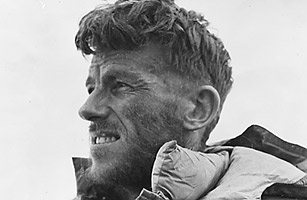
(2 of 7)
Concerning the allure of hiking and mountaineering: Some people love it because of the solitude, and choose to do it alone. Some like the teamwork. Some do it because of the thrill. What was it for you?
I enjoyed climbing with other people, good friends, but I did quite a lot of solo climbing, too. If I wished to do something, even if I couldn't find anyone who wanted to make the effort with me, I would go out solo climbing. I did find solo climbing very challenging, and a little frightening. You knew that you were completely on your own, and you had to overcome all the problems and possible dangers. Quite demanding, and quite an interesting experience.
Did you enjoy the tingle of fear?
I think I found fear a very stimulating factor. I'm sure the feeling of fear, as long as you can take advantage of it and not be rendered useless by it, can make you extend yourself beyond what you would regard as your capacity. If you're afraid, the blood seems to flow freely through the veins and you really do feel a sense of stimulation. If you can summon up your determination and motivation to overcome the fear, you seem to have more energy to tackle the problem and overcome it.
Did you find that you were more or less fearful by nature than your comrades?
I used to think that I was more fearful than my companions, but in later years, I discovered that they, like myself, concealed very much their fears. I think most people, when they're in a dangerous situation, or potentially dangerous situation, have that sense of fear. I was almost ashamed at times that I was fearful while my companions seemed to be drumming along. I found out later, in talking to them, that they were just as scared as I was.
Do you remember your first brush with fear?
The first peak I climbed in [New Zealand's] southern mountains was a very old route, but we had to climb up a long, steep snow-slope. I was aware that if I slipped on the slope I could possibly injure myself. I was aware that I had to be careful and there was danger. It was really a very small possibility of danger compared to my later situations, but at that time I was keenly aware of it. Getting up to the top of this little mountain and down again gave me probably as much pleasure as climbing a really difficult mountain did later on.
You became a serious climber on New Zealand's South Island.
Yes, but although I did a lot of climbing in New Zealand and a lot of backpacking and walking around the hills, I was a relatively late starter as a "serious" mountaineer. When I first went to the Himalayas in 1951, I was 31 years old. I really was at my prime, though some would think I was getting on. Himalayan climbers tend to mature fairly late. I think most of the successful Himalayan climbers have ranged from 28 to just over 40. When you're younger you're probably faster, but when you're older you have incredible endurance, and you also have a good deal more experience — you've had more experience being uncomfortable and miserable, whereas the younger person who is all go, go, really hasn't been all that miserable in his life. When you're climbing at high altitudes, life can be a pretty miserable business, and I think the older person is able to put up with this more easily than younger people.
So you had gained experience in the Southern Alps, you were part of a group of talented New Zealand climbers that included your friend George Lowe, you had joined these British expeditioners and, at 31, off you went to the Himalayas?
I was involved in two [Himalayan] expeditions in 1951, and then another one in 1952, before doing the top of Everest. I remember in 1951, we got to Australia to head for the Himalayas and we were interviewed by a large number of press people in Sydney. When we told them we weren't going to climb Mount Everest, they completely lost interest in us. One chap from one of the main Sydney papers, when I told him we weren't going to Everest, his face dropped. He said to me, "Have you ever been close to death?" And I said, "Well, I don't know. I've been scared a few times." He asked, "Has anybody ever died in the course of your trips?" And I said no. And he said to me, "Gosh, nothing exciting?" He was a real tough Sydney reporter. I quite liked him, but he was very disappointed in us.
When you first saw the Himalayas, were you awestruck?
No. When we first saw the Himalayan peaks, I was very impressed — they looked pretty good — but they didn't look all that different from what I'd been climbing in the Southern Alps.
Did you find yourselves up to the task?
Yes, I think so. Our first trip was very much a shoestring operation — we were pretty impoverished and most of our equipment was inadequate. For instance, I had a pair of boots which were very primitive and had rubber soles on them, and they were much too small for me, so I could only wear about one pair of thick socks and one pair of thin socks, which really was completely inadequate for climbing at high altitude in the Himalayas. Even though I had pretty good resistance to cold in my feet, that first trip I definitely had cold feet. But we still made a lot of new summits, and we did extremely well. We weren't using oxygen that trip. The highest mountain we climbed was just over 22,000 feet.